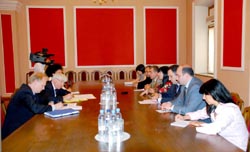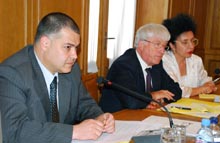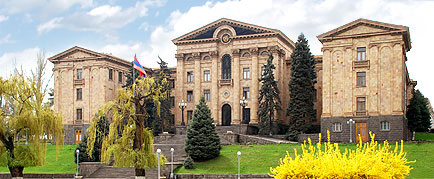On June 17 Mr Georges Colombier, Co-rapporteur of the Monitoring Committee of the Parliamentary Assembly of the Council of Europe (PACE) met with the representatives of four parliamentary factions: RPA, PAP, ARF and Country of Law, Mr Rafik Petrosyan, Mr Avet Adonts, Ms Naira Zohrabyan, Artyusha Shahbazyan and Mr Hovhannes Margaryan. Mr Colombier said that he wanted to get information about the issues concerning the Ad-hoc Committee formed in the National Assembly and the MPs.
RPA, PAP, ARF and Country of Law, Mr Rafik Petrosyan, Mr Avet Adonts, Ms Naira Zohrabyan, Artyusha Shahbazyan and Mr Hovhannes Margaryan. Mr Colombier said that he wanted to get information about the issues concerning the Ad-hoc Committee formed in the National Assembly and the MPs.
Ms Naira Zohrabyan, member of the Prosperous Armenia faction, noted that on June 16 the Ad-hoc Inquiry Committee into the Events Occurred on 1-2 March in Yerevan was formed. The Heritage opposition faction has not made any final decision for the participation of its work. Ms Zohrabyan noted that two MPs from each faction were included in the committee. The extra-parliamentary forces, as well as international experts, who will be chosen by the extra-parliamentary forces, will be invited. It was noted that the extra-parliamentary forces would have the right of consultative vote, and the can present their assessments in form of special opinion. Mr Avet Adonts, member of PAP faction, expressed confidence that the committee would not accept a decision that, the members having the right of consultative vote, would not agree. According to him the aim of the committee is the fair, unbiased inquiry of the events and the exclusion of such possible events.
Touching upon the 50/50 version proposed by the opposition on the formation of the committee, the member of the RPA faction Mr Rafik Petrosyan noted that neither the international acts nor the Constitution and legislation of the Republic of Armenia give any basis for that. The member of the Country of Law faction Mr Hovhannes Margaryan noted that the trust towards the committee, what Mr Colombier emphasized in his speech, would be clear in the result of its activity, simply an atmosphere of tolerance is necessary. Mr Artyush Shahbazyan held the same opinion, saying that if in Armenia being at the threshold of reforms, mutual constructive relations were not established, the system having problems of democratization would get deteriorated.
Georges Colombier, Co-rapporteur of the CE Monitoring Committee expressed regret that the committee having the mission of independent, objective and transparent investigation has not been formed exclusively with international experts. According to him, it would make undisputable the committee’s conclusion. Mr Colombier considered concerning the existence of the political prisoners, the fact of the changing accusations towards them, what, in his opinion, increases the distrust towards the justice. It was also noted that all the initiatives would fail unless the opposition leader Mr Levon Ter-Petrosyan insisted on his preconditions set free all the political prisoners. In response, it was said that in Armenia the presumption of innocence was respected, from 115 arrested people 17 are not free.
Touching upon the issue of implementing sanctions towards Armenia, Mr Colombier noticed that making decision would not be easy for the Council of Europe; it’s necessary to make efforts, to take positive steps in order not to apply sanctions.
In response it was noted that there was no clause in the PACE Resolution 1609, to which Armenia had not referred to and had not fulfilled the demands, as their fulfillment stemmed from the interest of  Armenia.
Armenia.
Mr Georges Colombier, Co-rapporteur of the CE Monitoring Committee met in the National Assembly with the members of the NA working group of the reforms of the Electoral Code.
Introducing the staff of the working group, Mr Davit Harutyunyan, head of the working group, chairman of the NA State and Legal Affairs, head of the Armenian delegation in PACE, noted that one representative from each parliamentary faction, in the group, one representative from each NGO, representatives of 7 presidential candidates from the 9, representatives of the OSCE Armenian Office and IFES, and experts. Mr Harutyunyan noted that the works were going on very effectively in the group, most of the decisions are adopted by consensus: all members of the working group have the right of voting.
Mr Colombier welcomed the activity of the working group and the procedure of adopting the working group, noting that it was a good precedent, and can serve as an example for the restoration of distrust with wider scale. The Co-rapporteur expressed hope that the recommendations would not remain on a paper and would be accepted by the authorities.




